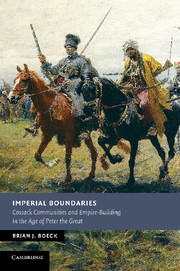Book contents
- Frontmatter
- Contents
- List of maps and illustrations
- Acknowledgments
- List of abbreviations
- 1 The Don region
- 2 The wider world of the Don steppe frontier
- Introduction
- 1 Beyond borders, between worlds: Russian Empire and the making of the Don steppe frontier
- 2 People and power on the frontier: liberty, diversity, and de-centralization in the Don region to 1700
- 3 A middle ground between autonomy and dependence: the raiding economy of the Don steppe frontier to 1700
- 4 Boundaries of integration or exclusion? Migration, mobility, and state sovereignty on the southern frontier to 1700
- 5 Testing the boundaries of imperial alliance: cooperation, negotiation and resistance in the era of Razin (1667–1681)
- 6 Between Rus' and Rossiia: realigning the boundaries of Cossack communities in a time of migration and transition (1681–1695)
- 7 The era of raskol: religion and rebellion (1681–1695)
- 8 Incorporation without integration: the Azov interlude (1695–1711)
- 9 From frontier to borderland: the demarcation of the steppe and the delegitimization of raiding (1696–1710)
- 10 Boundaries of land, liberty, and identity: making the Don region legible to imperial officials (1696–1706)
- 11 The Bulavin uprising: the last stand of the old steppe (1706–1709)
- 12 Reshaping the Don in the imperial image: power, privilege, and patronage in the post-Bulavin era (1708–1739)
- 13 Closing the Cossack community: recording and policing the boundaries of group identity (1708–1739)
- 14 A borderline state of mind: the closing of the Don steppe frontier (1708–1739)
- Afterword
- Index
- References
5 - Testing the boundaries of imperial alliance: cooperation, negotiation and resistance in the era of Razin (1667–1681)
Published online by Cambridge University Press: 12 January 2010
- Frontmatter
- Contents
- List of maps and illustrations
- Acknowledgments
- List of abbreviations
- 1 The Don region
- 2 The wider world of the Don steppe frontier
- Introduction
- 1 Beyond borders, between worlds: Russian Empire and the making of the Don steppe frontier
- 2 People and power on the frontier: liberty, diversity, and de-centralization in the Don region to 1700
- 3 A middle ground between autonomy and dependence: the raiding economy of the Don steppe frontier to 1700
- 4 Boundaries of integration or exclusion? Migration, mobility, and state sovereignty on the southern frontier to 1700
- 5 Testing the boundaries of imperial alliance: cooperation, negotiation and resistance in the era of Razin (1667–1681)
- 6 Between Rus' and Rossiia: realigning the boundaries of Cossack communities in a time of migration and transition (1681–1695)
- 7 The era of raskol: religion and rebellion (1681–1695)
- 8 Incorporation without integration: the Azov interlude (1695–1711)
- 9 From frontier to borderland: the demarcation of the steppe and the delegitimization of raiding (1696–1710)
- 10 Boundaries of land, liberty, and identity: making the Don region legible to imperial officials (1696–1706)
- 11 The Bulavin uprising: the last stand of the old steppe (1706–1709)
- 12 Reshaping the Don in the imperial image: power, privilege, and patronage in the post-Bulavin era (1708–1739)
- 13 Closing the Cossack community: recording and policing the boundaries of group identity (1708–1739)
- 14 A borderline state of mind: the closing of the Don steppe frontier (1708–1739)
- Afterword
- Index
- References
Summary
Beginning in the mid-seventeenth century, a significant shift occurred in the strategic objectives of the Muscovite government. After the construction of the Belgorod line Tatar raids could no longer penetrate the Russian heartland, making it possible for officials to incline their ears towards the chorus of voices calling for Russians to help their Orthodox brethren abroad. Upon accepting a major military commitment in Ukraine, Muscovite officials searched for a strategy that would bring security to their southern frontier. For the first time the tsar's relationship with the Don Cossacks was brought as a chip to the diplomatic bargaining table in 1667, but Russian officials still treated the Don region with flexibility in order to avoid imperial overreach.
This chapter examines how the shift in Russian strategic priorities tested the boundaries of the alliance between the Don Host and the Russian tsar. It connects the Razin rebellion to the consequences of the Russian involvement in Ukraine after 1654, but argues that neither event radically altered the separate deal between the tsar and the Don Cossacks. Remarkably, Tsar Aleksei Mikhailovich permitted his representatives to bargain with rebel leaders and failed to punish Don Cossacks who invaded Muscovite territory. The Host evaded implementing “autocratic” will in cases as small in scale as the arrest of a single Cossack criminal or as significant in scope as the construction of a key government fort.
- Type
- Chapter
- Information
- Imperial BoundariesCossack Communities and Empire-Building in the Age of Peter the Great, pp. 68 - 85Publisher: Cambridge University PressPrint publication year: 2009



